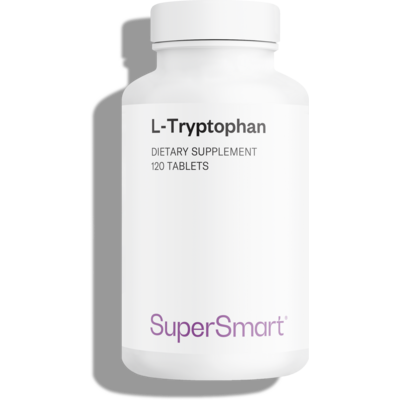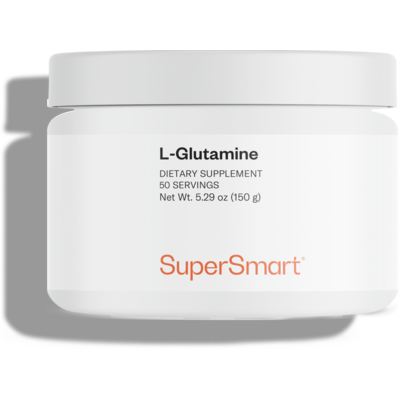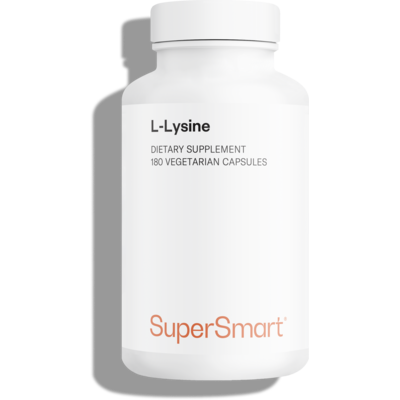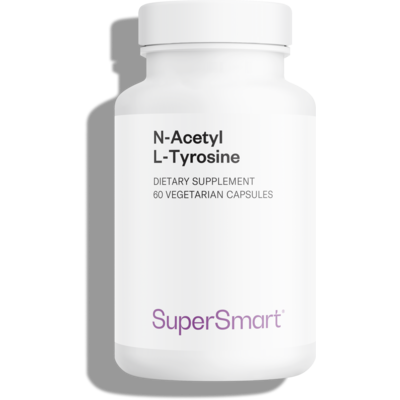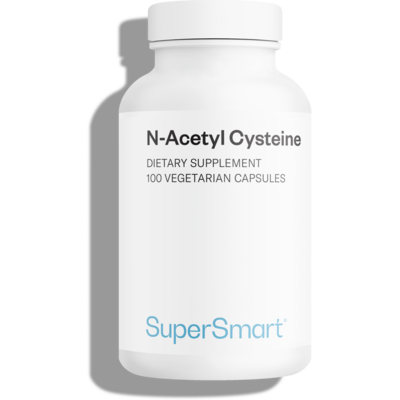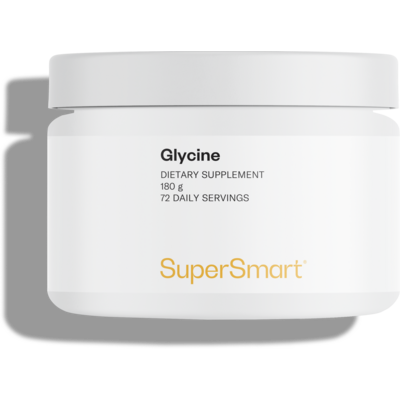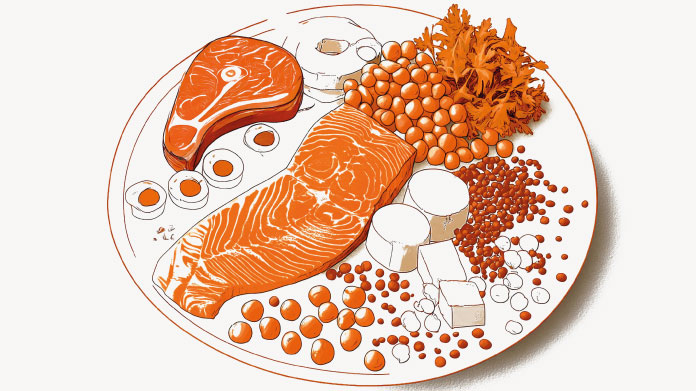Amino acids: in which foods and supplements are they found?
The basic building blocks of proteins, amino acids are found in foods as well as in dietary supplements. Find out how to ensure you’re getting enough.
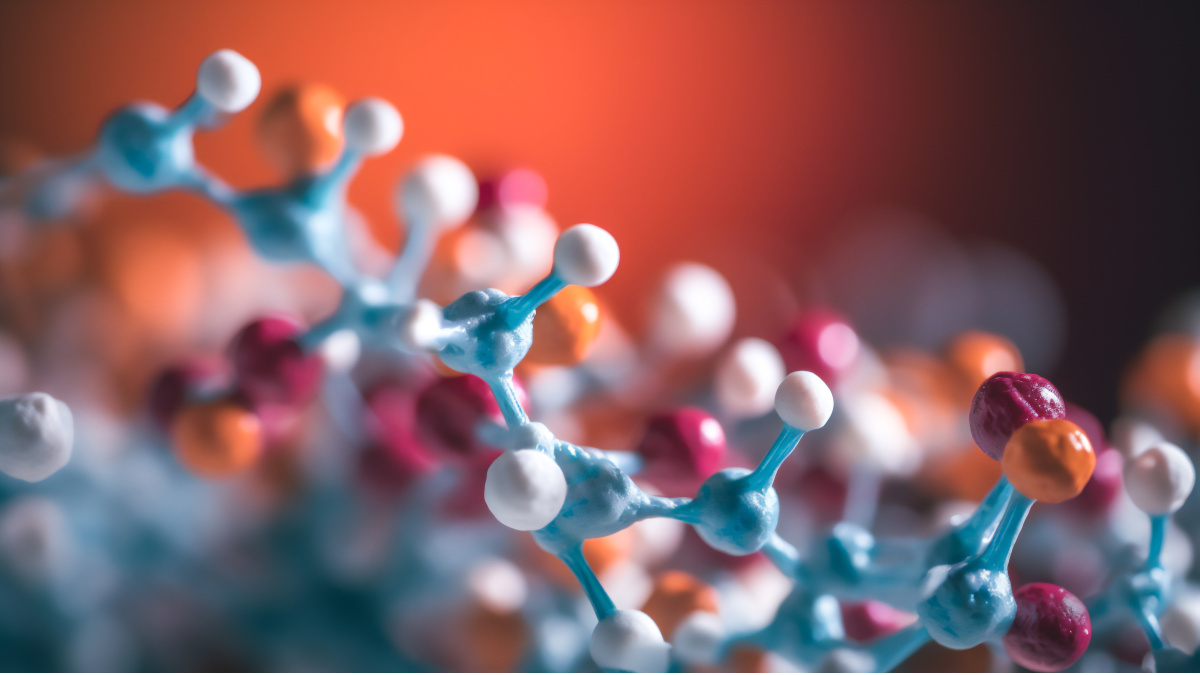
What role do amino acids play in the body?
Chemically speaking, an amino acid is a complex molecule which has a carboxyl group (formula COOH) and a functional amine group (formula NH2 or NH). Almost 500 have been identified in the living world, classified into different categories depending on their configuration.
Among them are the proteinogenic amino acids which play a crucial role as they constitute the building blocks of proteins. Common to all living beings, there are precisely 20 of them in the human body and they combine together to form peptide bonds (1).
Involved in the synthesis of structural, contractile and transport proteins, as well as immunoglobulins, enzymes and hormones (such as insulin), they play an important role in the body’s integrity and growth: maintaining homeostasis, supporting muscle development and immunity… (2)
They are distinct in having (with one exception) the same fundamental structure of H2N–HCR–COOH. In addition to the usual amino and carboxyl groups, they have a carbon atom, a hydrogen atom and a variable R chain. It’s the latter which distinguishes one amino acid from another and determines its chemical and functional properties (3).
Of these proteinogenic amino acids, nine are considered ‘essential’. In other words, our bodies are unable to synthesise them and we need to obtain them from our daily diet (4).
It should be noted that not all amino acids produced by the body are not necessarily integrated into proteins. They do, however, participate in equally crucial physiological processes. This is the case with citrulline, present in abundance in the Cucurbitaceae or gourd family, which is a key intermediate in the urea cycle (5).
The 20 proteinogenic amino acids
The 20 amino acids present in human proteins are (6):
- alanine;
- arginine;
- asparagine;
- aspartate;
- cysteine;
- glutamate;
- glutamine;
- glycine;
- histidine;
- isoleucine;
- leucine;
- lysine;
- methionine;
- phenylalanine;
- proline;
- serine;
- threonine;
- tryptophan;
- tyrosine;
- valine.
The 9 essential amino acids and their dietary sources
Leucine
Leucine acts as a trigger in building muscle at a cellular level and is involved in energy production (7). It is found in meat, fish, dairy products and soya. Many athletes benefit from it by taking branched-chain amino acid supplements (BCAA) to support their performance (8).
Isoleucine
Another of the three branched-chain amino acids in BCAA, isoleucine is found in hemoglobin and modulates how the body uses blood sugars (9). In addition to animal-source products, it is in nuts, spirulina, sunflower seeds and chickpeas.
Phenylalanine
A tyrosine precursor, phenylalanine is involved in the synthesis of catecholamines (adrenaline, noradrenaline) (10). Good sources include meat, fish, soya, oleaginous fruits and potatoes, and to a lesser degree, whole grains.
Tryptophan
Tryptophan is used to make serotonin (‘happiness hormone’ and by extension, melatonin (‘sleep hormone’) (11). Deficiency can therefore cause sleep problems or mood disorders. Wholegrain rice, dairy products, nuts and chocolate are all good sources, which are absorbed even more effectively in the presence of sugars.
If you’re feeling irritable or down, or are not getting enough restful sleep, it might be wise to boost your dietary intake by taking a tryptophan supplement (such as the powerful L-Tryptophan) (12).
Threonine
Contributing to the formation of connective tissue (elastin and collagen), threonine also plays a key role in digestion (13). Soya beans, veal, turkey and cod all contain significant amounts.
Lysine
In competition with arginine, lysine is involved in many biological bone and connective tissue functions, in carbohydrate metabolism and in the production of antibodies (14). Abundant in the animal kingdom, it is also found at appreciable levels in pulses, corn and fermented foods.
While it’s rare to be lacking in lysine, prolonged intense stress or malnutrition can cause deficiency (taking a lysine supplement, such as L-Lysine, can help boost your intake) (15).
Valine
The third of the amino acids in BCAA, valine supports good physical and muscle recovery after exercise (16). It’s primarily found in cheese, pumpkin seeds, chia seeds and sunflower seeds.
Methionine
Different from the other amino acids in its sulfur-containing structure, methionine underpins liver function and strong defense mechanisms (17). It requires a simultaneous intake of vitamin B12 to be fully absorbed. Nuts, beef, parmesan, fish and whole grains are all good sources.
Histidine
Considered essential in children and pregnant women, histidine is an amino acid which can be partially produced by adults in general and for them it is thus regarded as semi-essential. It acts as a precursor of histamine (released in allergic reactions), and is also found in pancreatic enzymes and in hemoglobin where it neutralizes the blood pH (18). The best food sources are parmesan, chicken, bacon, tofu and steak.
In which foods are the 9 essential amino acids found?
Generally speaking, amino acids are found in animal protein (meat, fish, eggs, dairy products) and plant protein (grains, legumes, nuts…) (19).
However, it’s animal protein which contains the 9 essential amino acids in sufficient amounts (giving it a higher biological value). This is rarely the case for plants except for soya and its derivatives, quinoa, and buckwheat (20-21).
Grains are generally deficient in lysine and legumes in methionine (22-23). These amino acid deficits can be problematic as they limit protein synthesis.
Vegetarians and vegans are thus advised to ingest both at the same meal (rice with kidney beans, semolina with chickpeas… ) (24). Combining in this way is perfectly achievable for adults over a day.
Semi-essential amino acids
As we’ve seen with histidine, certain amino acids are considered to be semi-essential: they can theoretically be produced by the body but only under certain conditions. Endogenous production may prove insufficient, especially in early childhood or in the case of underlying disease (kidney failure, for example).
Arginine, cysteine, glutamine, glycine, proline and tyrosine all fall into this category and should therefore be provided by the diet when metabolism requires it (25-26). Supplementing with certain semi-essential amino acids can provide a useful boost in some cases: click on the name of a particular amino acid in those listed above to find the corresponding supplement (27-28).
SuperSmart ADVICE
References
- Hou Y, Wu G. Nutritionally Essential Amino Acids. Adv Nutr. 2018 Nov 1;9(6):849-851. doi: 10.1093/advances/nmy054. PMID: 30239556; PMCID: PMC6247364.
- National Research Council (US) Subcommittee on the Tenth Edition of the Recommended Dietary Allowances. Recommended Dietary Allowances: 10th Edition. Washington (DC): National Academies Press (US); 1989. 6, Protein and Amino Acids. Available from: https://www.ncbi.nlm.nih.gov/books/NBK234922/?report=classic
- Sanvictores T, Farci F. Biochemistry, Primary Protein Structure. [Updated 2022 Oct 31]. In: StatPearls [Internet]. Treasure Island (FL): StatPearls Publishing; 2023 Jan-. Available from: https://www.ncbi.nlm.nih.gov/books/NBK564343/
- Lopez MJ, Mohiuddin SS. Biochemistry, Essential Amino Acids. [Updated 2023 Mar 13]. In: StatPearls [Internet]. Treasure Island (FL): StatPearls Publishing; 2023 Jan-. Available from: https://www.ncbi.nlm.nih.gov/books/NBK557845/
- Allerton TD, Proctor DN, Stephens JM, Dugas TR, Spielmann G, Irving BA. l-Citrulline Supplementation: Impact on Cardiometabolic Health. 2018 Jul 19;10(7):921. doi: 10.3390/nu10070921. PMID: 30029482; PMCID: PMC6073798.
- Lopez MJ, Mohiuddin SS. Biochemistry, Essential Amino Acids. [Updated 2023 Mar 13]. In: StatPearls [Internet]. Treasure Island (FL): StatPearls Publishing; 2023 Jan-. Available from: https://www.ncbi.nlm.nih.gov/books/NBK557845/
- Pedroso JA, Zampieri TT, Donato J Jr. Reviewing the Effects of L-Leucine Supplementation in the Regulation of Food Intake, Energy Balance, and Glucose Homeostasis. 2015 May 22;7(5):3914-37. doi: 10.3390/nu7053914. PMID: 26007339; PMCID: PMC4446786.
- Khemtong C, Kuo CH, Chen CY, Jaime SJ, Condello G. Does Branched-Chain Amino Acids (BCAAs) Supplementation Attenuate Muscle Damage Markers and Soreness after Resistance Exercise in Trained Males? A Meta-Analysis of Randomized Controlled Trials. Nutrients. 2021 May 31;13(6):1880. doi: 10.3390/nu13061880. PMID: 34072718; PMCID: PMC8230327.
- National Center for Biotechnology Information (2023). PubChem Compound Summary for CID 6306, l-Isoleucine. Retrieved May 23, 2023 from https://pubchem.ncbi.nlm.nih.gov/compound/l-Isoleucine.
- Jenkins TA, Nguyen JC, Polglaze KE, Bertrand PP. Influence of Tryptophan and Serotonin on Mood and Cognition with a Possible Role of the Gut-Brain Axis. 2016 Jan 20;8(1):56. doi: 10.3390/nu8010056. PMID: 26805875; PMCID: PMC4728667.
- Richard DM, Dawes MA, Mathias CW, Acheson A, Hill-Kapturczak N, Dougherty DM. L-Tryptophan: Basic Metabolic Functions, Behavioral Research and Therapeutic Indications. Int J Tryptophan Res. 2009 Mar 23;2:45-60. doi: 10.4137/ijtr.s2129. PMID: 20651948; PMCID: PMC2908021.
- Tang Q, Tan P, Ma N, Ma X. Physiological Functions of Threonine in Animals: Beyond Nutrition Metabolism. 2021 Jul 28;13(8):2592. doi: 10.3390/nu13082592. PMID: 34444752; PMCID: PMC8399342.
- Hu Y, Feng L, Jiang W, Wu P, Liu Y, Kuang S, Tang L, Zhou X. Lysine deficiency impaired growth performance and immune response and aggravated inflammatory response of the skin, spleen and head kidney in grown-up grass carp (Ctenopharyngodon idella). Anim Nutr. 2021 Jun;7(2):556-568. doi: 10.1016/j.aninu.2020.07.009. Epub 2021 Mar 7. PMID: 34258445; PMCID: PMC8245797.
- Vuvor F, Mohammed H, Ndanu T, Harrison O. Effect of lysine supplementation on hypertensive men and women in selected peri-urban community in Ghana. BMC Nutr. 2017 Jul 27;3:67. doi: 10.1186/s40795-017-0187-6. PMID: 32153847; PMCID: PMC7050943.
- National Center for Biotechnology Information (2023). PubChem Compound Summary for CID 6287, Valine. Retrieved May 23, 2023 from https://pubchem.ncbi.nlm.nih.gov/compound/Valine.
- Martínez Y, Li X, Liu G, Bin P, Yan W, Más D, Valdivié M, Hu CA, Ren W, Yin Y. The role of methionine on metabolism, oxidative stress, and diseases. Amino Acids. 2017 Dec;49(12):2091-2098. doi: 10.1007/s00726-017-2494-2. Epub 2017 Sep 19. PMID: 28929442.
- Kessler AT, Raja A. Biochemistry, Histidine. [Updated 2022 Jul 18]. In: StatPearls [Internet]. Treasure Island (FL): StatPearls Publishing; 2023 Jan-. Available from: https://www.ncbi.nlm.nih.gov/books/NBK538201/
- Górska-Warsewicz H, Laskowski W, Kulykovets O, Kudlińska-Chylak A, Czeczotko M, Rejman K. Food Products as Sources of Protein and Amino Acids-The Case of Poland. 2018 Dec 13;10(12):1977. doi: 10.3390/nu10121977. PMID: 30551657; PMCID: PMC6315330.
- Craine EB, Murphy KM. Seed Composition and Amino Acid Profiles for Quinoa Grown in Washington State. Front Nutr. 2020 Aug 12;7:126. doi: 10.3389/fnut.2020.00126. Erratum in: Front Nutr. 2020 Nov 09;7:605674. PMID: 32903386; PMCID: PMC7434868.
- Michelfelder AJ. Soy: a complete source of protein. Am Fam Physician. 2009 Jan 1;79(1):43-7. PMID: 19145965.
- Bandyopadhyay S, Kuriyan R, Shivakumar N, Ghosh S, Ananthan R, Devi S, Kurpad AV. Metabolic Availability of Lysine in Milk and a Vegetarian Cereal-Legume Meal Determined by the Indicator Amino Acid Oxidation Method in Indian Men. J Nutr. 2020 Oct 12;150(10):2748-2754. doi: 10.1093/jn/nxaa235. PMID: 32840572.
- Müntz K, Christov V, Saalbach G, Saalbach I, Waddell D, Pickardt T, Schieder O, Wüstenhagen T. Genetic engineering for high methionine grain legumes. Nahrung. 1998 Aug;42(3-4):125-7. doi: 10.1002/(sici)1521-3803(199808)42:03/04<125::aid-food125>3.3.co;2-1. PMID: 9739551.
- Bouchard J, Malalgoda M, Storsley J, Malunga L, Netticadan T, Thandapilly SJ. Health Benefits of Cereal Grain- and Pulse-Derived Proteins. Molecules. 2022 Jun 10;27(12):3746. doi: 10.3390/molecules27123746. PMID: 35744874; PMCID: PMC9229611.
- Appleton J. Arginine: Clinical potential of a semi-essential amino acid. Altern Med Rev. 2002 Dec;7(6):512-22. PMID: 12495375.
- Aliu E, Kanungo S, Arnold GL. Amino acid disorders. Ann Transl Med. 2018 Dec;6(24):471. doi: 10.21037/atm.2018.12.12. PMID: 30740402; PMCID: PMC6331359.
- Mokhtari V, Afsharian P, Shahhoseini M, Kalantar SM, Moini A. A Review on Various Uses of N-Acetyl Cysteine. Cell J. 2017 Apr-Jun;19(1):11-17. doi: 10.22074/cellj.2016.4872. Epub 2016 Dec 21. PMID: 28367412; PMCID: PMC5241507.
- Hoffer LJ, Sher K, Saboohi F, Bernier P, MacNamara EM, Rinzler D. N-acetyl-L-tyrosine as a tyrosine source in adult parenteral nutrition. JPEN J Parenter Enteral Nutr. 2003 Nov-Dec;27(6):419-22. doi: 10.1177/0148607103027006419. PMID: 14621123.
Keywords
2 Days
great products and prices
great products and prices
Marie
7 Days
Easy to navigate site
Easy to navigate site, had what I was searching for, good price. easy order-check out
James Tucker
14 Days
My skin is clearing up nicely!
Pretty good for my skin so far.
Christian
16 Days
The new packaging is excellent
The new packaging is excellent - finally! No more squashed boxes and torn envelopes.
GORAN
17 Days
Great Product
Great Product
Larry Garrett
21 Days
Quick shipping
Quick shipping; good price. No issues!
Mary McCarty
22 Days
Thr product is very good and is helping…
Thr product is very good and is helping me on my health. Then is always on time
LUGO Luz
25 Days
Buying was fine
Buying was fine. I had problems with the website not recognizing my login info, and had to call to get it fixed. Other than that, everything was good.
David S. Clark
25 Days
Your super maca and super ginseng are…phenomenal
Your super maca and super ginseng are phenomenal supplements that compliment each other when taking them together. Fantastic feeling of well-being and lots of mid day energy without the crash.
Keith Mason
28 Days
I have had amazing results with every…
I have had amazing results with every supplement I've purchased. I am extremely satisfied with this company
kirstin Torres
28 Days
Fine products
Fine products . They are on the leading edge of online supplements. The only issue -so far-is they sometime run out of subscription items.
Jason Argos
31 Days
The ordering process is very user…
The ordering process is very user friendly and the products always come in a timely manner.
CARTER Rhonda
32 Days
The price for Dr
The price for Dr. Pero's AC-11 is reasonable and in line with his views. (my former colleague). Keep it pure.
CAMPBELL Clayton
35 Days
Right on every time.
Right on every time.
Arthur Nicholas
37 Days
They are cheaper than everyone else and…
They are cheaper than everyone else and the shipping was fast. Great company.
Patricia Adams


